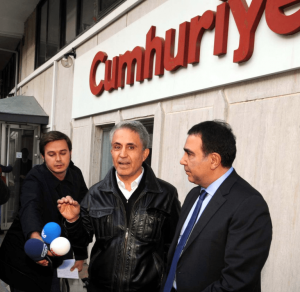The trial of Turkish cartoonist Musa Kart and 16 colleagues from the newspaper Cumhuriyet, which began on Monday nine months after their initial arrests, is still ongoing as of Friday morning. In a hearing statement earlier this week, Kart pushed back forcefully against the spurious charges of aiding a terrorist organization, proclaiming that “this indictment has severed all contact with objective reality, is beyond the bounds of reason and cannot be taken seriously.”
Cumhuriyet is the only major independent newspaper remaining in Turkey, and the case is seen as virtually the last stand for free press in that country. President Recep Tayyip Erdoğan has used last year’s failed coup as cover for a purge of media outlets, universities and the military and judiciary, ousting people claimed to be supporters of exiled cleric Fethullah Gülen.
Turkey’s government has accused Gülen followers of plotting the coup and relabeled them as a terrorist organization, FETÖ. Kart and his colleagues are charged with “aiding and abetting” FETÖ–an accusation that Erdoğan has leveled against independent journalists with abandon. About 150 journalists are currently jailed in Turkey, and 173 media outlets have been shut down or taken over by the government in the past year.
In Kart’s trial statement, translated to English on the Association of American Editorial Cartoonists website, he highlighted the particularly ludicrous nature of the charges against Cumhuriyet, a secular leftwing paper that has scrutinized the Gülenist movement as doggedly as it has Erdoğan’s government:
I have had the privilege of being Cumhuriyet newspaper’s cartoonist for twenty-three years. If some unprejudiced research had been conducted in this case it would have been seen that my signature is there, under the most scathing cartoons of terrorist organisations, primarily those of FETÖ. And the fact that these anti-terrorist cartoons have appeared on the front page for the last six years is further proof that my paper should not be held up as being aligned with a terrorist organisation.
Kart also expounded on the role of cartoonists and humorists in society, pointing out that his kind do not tend to fit in either with terrorist organizations or with authoritarian regimes:
It is against the very nature of things for cartoons and their creators to align themselves with a culture of submissiveness and with entities that are unbending and based upon crude hierarchical relations that promote violence. Courageous and independent view points that have broken free of cliché and standardised forms are what make for a true and effective cartoon. Conversely, organisational structures based upon strict hierarchical relations cannot create a platform upon which a cartoonist can seek the freedom they need. Whilst organisational structures that are based upon violence rely upon taboos, the role of humour and of cartoons is to categorically destroy taboo. For that reason, those opposed to democracy do not like humorists and humorists, likewise, have no time for structures that worship violence.
Kart has long been a critic of Erdoğan, winning the 2005Courage in Editorial Cartooning Award from Cartoonists Rights Network International after he successfully fought a lawsuit over a cartoon depicting the then-Prime Minister as “a kitten entangled in a ball of yarn.” In 2014 he was againacquitted after Erdoğan sued over another cartoon that criticized his apparent role in a graft scandal. If convicted on the current charges, he could face up to 29 years in prison.
Help support CBLDF’s important First Amendment work in 2017 by visiting the Rewards Zone, making a donation, or becoming a member of CBLDF!
Contributing Editor Maren Williams is a reference librarian who enjoys free speech and rescue dogs.
